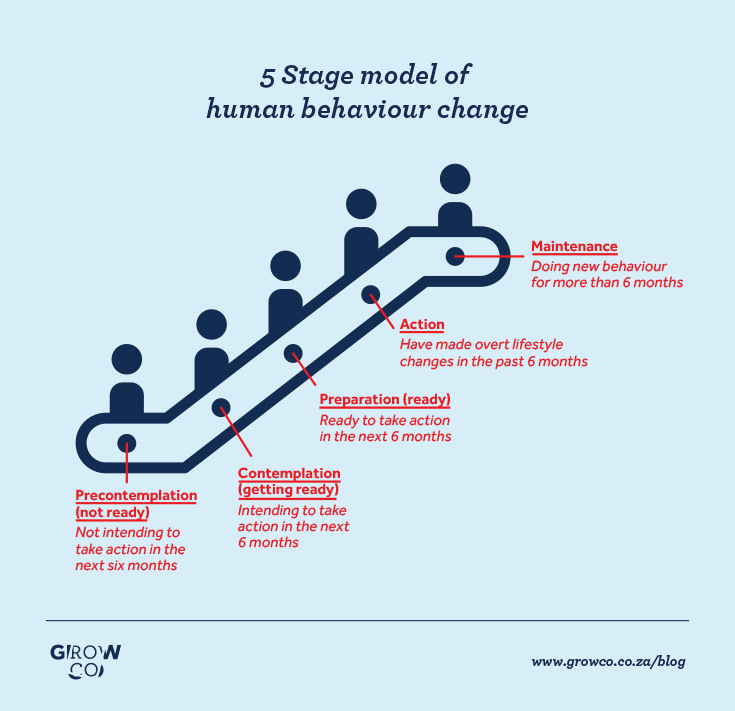Change in human behavior is not just inevitable; it’s an essential aspect of our existence that shapes our identities and experiences. The psychology of change emphasizes how adaptable we are, driven by personal growth and change as we navigate through various stages of life. According to research, including insights from the Harvard Study on Adult Development, change is a powerful catalyst for self-improvement, allowing us to thrive in the face of adversity. While some may fear transformation, embracing change can ultimately lead to profound realizations and a more enriched life. As we enter a new year, understanding the dynamics of change in our lives becomes increasingly relevant, encouraging us to approach our evolution with optimism and acceptance.
Transformations in the way we behave are integral to the human experience, often referred to as behavioral evolution. Social psychologists explore how external factors and internal motivations foster personal development and adaptation throughout life. Studies, such as those conducted by renowned institutions, reveal that significant shifts can occur at any age, often catalyzed by life events or aspirations for self-betterment. Many individuals find themselves grappling with the discomfort of adapting to new circumstances, reflecting a broader societal trend towards embracing or resisting change. As we collectively move forward, understanding these nuances of behavioral change becomes essential in cultivating a healthier relationship with ourselves and others.
Understanding the Psychology of Change
Change is an inevitable part of life that can evoke a mix of emotions, including excitement, anxiety, or resistance. Understanding the psychology of change is crucial for personal growth and self-improvement. Researchers in psychology, including those involved in the Harvard Study on Adult Development, emphasize that people’s capacity for change is not limited to their youth; rather, it is a continuous process that can occur at any point in life. This ongoing evolution highlights the importance of embracing change as a fundamental aspect of human experience.
Empirical studies suggest that our perceptions of change often stem from cognitive biases, where we tend to remember negative experiences more vividly than positive ones. This bias can make it seem as though we are resistant to change, but in reality, change is constantly happening. By recognizing and challenging these misconceptions, individuals can cultivate a healthier mindset that allows them to embrace their evolving selves. Ultimately, the psychology of change serves as a reminder that each stage of life brings new opportunities for growth and self-discovery.
The Role of Resistance in Personal Transformation
Resistance to change is a common psychological phenomenon that can hinder personal growth. Some individuals cling to familiar habits and routines as a means of maintaining stability and comfort, even when it becomes detrimental. This resistance often stems from fear of the unknown or a lack of trust in their ability to navigate new circumstances. Psychologists suggest that acknowledging this resistance can be the first step towards overcoming it, as it provides insight into the underlying fears that hinder progress in personal development.
Furthermore, understanding the dynamics of resistance can empower individuals to take proactive steps towards change. For example, reframing change as a journey of self-improvement rather than an obstacle can shift the perspective of individuals who feel stuck. This approach aligns with the insights shared in the Harvard Study on Adult Development, which suggests that those who actively engage with their resistance are more likely to experience meaningful transformations. By embracing the discomfort of change rather than avoiding it, individuals can catalyze significant shifts in their lives.
Embracing Change for Greater Well-Being
Embracing change is not only essential for personal growth but also for overall well-being. The experts from the Harvard podcast emphasize that accepting change as a natural part of life can lead to improved mental health and happiness. By cultivating an attitude of openness towards new experiences and perspectives, individuals can better adapt to life’s challenges and transitions. This mindset encourages resilience, allowing people to navigate difficulties with greater ease and confidence.
Moreover, embracing change can foster stronger relationships and connections with others. As individuals grow and evolve, they often form deeper bonds with those who support their journey. The willingness to change can also inspire others to reflect on their own experiences, creating a positive feedback loop that promotes collective growth. This communal aspect of change reinforces the importance of shared experiences and understanding, which play a vital role in fostering a supportive environment for everyone involved.
The Impact of Disillusionment on Human Behavior
Disillusionment is a powerful catalyst for change that can influence human behavior in profound ways. As discussed by experts in the Harvard podcast, individuals may respond to feelings of disillusionment with bitterness and withdrawal or, conversely, with a broader understanding of life’s complexities. This duality illustrates that disillusionment does not inherently lead to negative outcomes; instead, it can serve as a turning point that encourages personal growth and self-improvement.
The key lies in how individuals interpret and respond to their disillusioning experiences. Those who view disillusionment as an opportunity for introspection and change often emerge stronger and more resilient. This concept aligns with the findings of the Harvard Study on Adult Development, which indicate that individuals who cultivate a growth mindset are better equipped to navigate life’s challenges. By reframing their narratives around disillusionment, people can embrace it as a stepping stone towards greater self-awareness and fulfillment.
The Power of Agency in Personal Change
Agency plays a crucial role in the process of personal change, as it refers to the capacity of individuals to act independently and make their own choices. The podcast highlights that despite the influence of situational factors on behavior, individuals have the power to redefine their paths. This understanding is essential for those who seek self-improvement and wish to enact meaningful change in their lives.
Furthermore, fostering a sense of agency can empower individuals to challenge limiting beliefs and habitual patterns. Psychological studies reveal that those who actively engage in self-reflection and take ownership of their decisions are more likely to experience successful transitions. By reinforcing their own agency, individuals can cultivate a proactive attitude towards change, ultimately leading to increased resilience and adaptability as they navigate life’s complexities.
The Cycle of Change and Personal Growth
The cycle of change is an ongoing process that intertwines with personal growth, emphasizing that change is not merely a one-time occurrence. In the context of human development, individuals may go through multiple cycles of change throughout their lives, each contributing to their overall growth and understanding of the self. This cyclical nature of change is informed by insights from the Harvard Study on Adult Development, which emphasizes the role of life experiences in shaping who we become.
Each cycle of change brings new challenges and lessons that foster deeper self-awareness and resilience. As individuals navigate through these changes, they accumulate knowledge that informs their future decisions and behaviors. The recognition that change is part of a larger cycle allows people to approach personal growth with patience and curiosity, knowing that each step contributes to their ongoing journey of self-discovery and transformation.
Cognitive Biases and Change Perception
Cognitive biases significantly impact how individuals perceive change in their lives. These biases often lead people to focus on negative experiences or outcomes, causing them to underestimate the positive changes they may have undergone over time. The podcast discussion emphasizes the importance of recognizing these biases in order to foster a more balanced view of personal development. By acknowledging these perceptual tendencies, individuals can move beyond limiting narratives that hinder their capacity for growth.
For instance, the inherent negativity bias tends to skew our focus towards challenges and setbacks rather than achievements and progress. This understanding can empower individuals to actively practice gratitude and self-reflection, allowing them to recognize their growth amidst difficulties. By consciously shifting their perspective on change, individuals can cultivate resilience and a greater sense of agency in their lives, ultimately leading to more fulfilling experiences.
Societal Perspectives on Change and Growth
The societal context in which individuals live can greatly influence their attitudes towards change and personal growth. The podcast discusses how cultural norms shape perceptions of change, illustrating the dichotomy between those who embrace innovation and those who prefer tradition. This societal backdrop often dictates the available support systems for individuals undergoing personal transformations, impacting their willingness to seek out growth opportunities.
Moreover, societal perspectives can either facilitate or inhibit personal growth by influencing the narratives we share about change. When communities actively promote the idea that change is a valuable and necessary aspect of life, individuals are more likely to feel empowered to pursue self-improvement. Conversely, when cultures stigmatize change or promote a fixed mindset, individuals may feel restricted in their ability to evolve. Thus, fostering a supportive societal landscape for change is essential for maximizing personal and collective growth.
Change Across the Human Lifespan
The concept of change is often misunderstood, particularly when it comes to different life stages. The Harvard experts emphasize that change occurs continuously throughout the human lifespan, from childhood through adulthood and into old age. Each phase of life presents unique challenges and opportunities for growth, highlighting the importance of viewing change as a lifelong journey rather than a series of isolated events.
Research into adult development reveals that significant transformations can occur well into later years, defying the stereotype that change is limited to youth. Embracing this view encourages individuals of all ages to remain open to new experiences and insights, fostering a culture of lifelong learning and adaptation. By recognizing that change is an inherent part of the human experience, individuals can cultivate a greater sense of purpose and fulfillment as they navigate the complexities of life.
The Importance of Self-Acceptance in Change
Self-acceptance is a critical aspect of navigating change and personal growth. As discussed in the podcast, individuals often grapple with their self-image during periods of transformation, leading to feelings of inadequacy or doubt. By cultivating self-acceptance, individuals can create a foundation for embracing change without fear or resistance.
Moreover, self-acceptance enables individuals to appreciate their unique journeys and the value of their experiences. Recognizing that change does not negate their worth fosters a healthier relationship with the self, allowing for more genuine connections with others. This balance between striving for improvement and accepting oneself is essential for sustainable growth, paving the way for a more fulfilling and meaningful life.
Frequently Asked Questions
What is the psychology of change in human behavior?
The psychology of change in human behavior refers to understanding how and why individuals undergo transformation in their thoughts, emotions, and actions. It encompasses theories from personal growth and change, showing that positive change often requires both awareness and intentional efforts. For instance, studies like the Harvard Study on Adult Development reveal that our capacity to adapt and evolve throughout life is significant, often influenced by our experiences, relationships, and the conscious decisions we make for self-improvement.
How does embracing change contribute to personal growth and change?
Embracing change is a crucial aspect of personal growth and change because it allows individuals to develop resilience and adaptability. By accepting that change is a natural part of life, people can better navigate challenges and seize opportunities for self-improvement. This perspective also aligns with insights from psychology, highlighting that those who view changes as chances for development—rather than threats—are more likely to thrive and achieve long-term happiness.
What role does the Harvard Study on Adult Development play in understanding changes in human behavior?
The Harvard Study on Adult Development provides invaluable insights into changes in human behavior by tracking the lives of participants over decades. This extensive research has shown that understanding relationships and emotional resilience significantly impacts happiness and well-being. The findings suggest that as we age, our capacity for change persists, countering the myth that personal growth diminishes in adulthood. This study emphasizes the importance of making intentional efforts toward self-improvement throughout life.
In what ways can self-improvement lead to lasting changes in behavior?
Self-improvement can lead to lasting changes in behavior by fostering a growth mindset, encouraging individuals to set specific, achievable goals. By actively engaging in self-reflection and seeking feedback, people can make informed adjustments to their habits and actions. Psychological theories support this notion, indicating that persistence and effort in the face of challenges enhance our ability to adapt and develop beneficial changes over time.
How can negative experiences influence change in human behavior?
Negative experiences often catalyze profound changes in human behavior by prompting individuals to reassess their beliefs, habits, and emotional responses. This process can lead to either withdrawal and cynicism or to a deeper understanding and acceptance of reality, allowing for personal growth. Understanding this dual potential is crucial in fields like psychology of change, where experts emphasize the importance of resilience and the capacity to harness adversity as a stepping stone for self-improvement.
What strategies can help individuals embrace change effectively?
To embrace change effectively, individuals can adopt several strategies: 1) Cultivate a growth mindset by viewing challenges as opportunities for self-improvement. 2) Develop mindfulness practices to stay present and reduce anxiety about the unknown. 3) Set realistic goals and celebrate small achievements along the way. 4) Seek social support, which reinforces resilience during transitions. These methods resonate with psychological theories on personal growth and highlight the benefits of proactive behavior in adapting to change.
What is the relationship between discomfort and personal growth during change?
Discomfort often acts as a catalyst for personal growth during change, pushing individuals beyond their comfort zones. Psychological research indicates that while discomfort can lead to resistance, engaging with it allows for meaningful transformation. Embracing uncomfortable situations typically encourages self-exploration and fosters resilience. Thus, the relationship between discomfort and personal growth is integral, as the willingness to confront unease can open pathways to development and positive change.
Why do some individuals resist change, according to psychological perspectives?
Some individuals resist change due to psychological factors such as fear of the unknown, attachment to familiar routines, and cognitive biases that favor stability over uncertainty. Many people hold onto their established identities, which can make the prospect of change daunting. Psychological theories emphasize that this resistance often stems from a desire to maintain control and predictability in life, which underscores the importance of addressing these fears to facilitate a healthier attitude towards embracing change.
| Key Points | Details |
|---|---|
| Inevitability of Change | Change is constant and inevitable in human life, impacting our well-being. |
| Resistance to Change | Resistance can lead to suffering, illustrating the need to embrace change. |
| Subconscious Change | Not all change is intentional; it often occurs subconsciously due to life experiences. |
| Impact of Disillusionment | People respond to disillusionment in different ways, which can influence personal growth. |
| Biological and Cultural Change | Change occurs at various life stages and can be shaped by cultural and biological factors. |
| Individual Differences in Change | Some people are more inclined to embrace change than others, influenced by temperament. |
| Societal Perspectives on Change | Cultural beliefs about change can vary, affecting how individuals perceive growth. |
Summary
Change in human behavior is an inherent aspect of our lives, impacting our thoughts, beliefs, and interactions with the world. As we navigate through transformations, both intentional and unintentional, we must recognize that change is not just possible, but essential for personal development and societal evolution. Understanding the factors influencing change can help us embrace growth and adapt positively to new circumstances.


